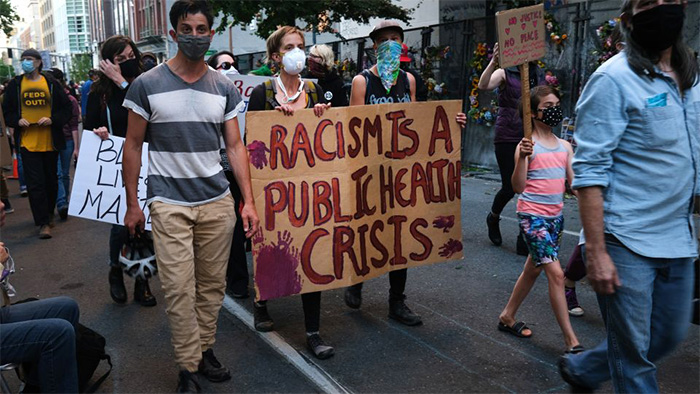Protesters in Portland, Oregon gather during the pandemic. CNN/Getty Images
Health and quality of life are fundamentally influenced by “social determinants of health” (SDOH) a phrase that, simply put, encompasses the conditions of life that affect health, from financial stability and education to housing, transportation and food security.
SDOH also contributes to wide inequities in health. People who lack adequate health insurance, for example, are less likely to receive good health care. People who don't have access to grocery stores with healthy foods have worse health outcomes.
Race and ethnicity compound the problem. People in some minorized racial and ethnic groups experience higher rates of poor health and disease for a range of health conditions, including diabetes, obesity, asthma, heart disease and cancer, compared to their white counterparts. The life expectancy among Black or African Americans, for example, is four years lower than that of white people.
“Race and ethnicity are social, not biological, constructs and they serve as a proxy for racism: the structures, policies, practices, laws and norms that unfairly disadvantage some individuals and communities, while unfairly advantaging other individuals and communities,”said Crystal Cené, MD, MPH, chief administrative officer for health justice, equity, diversity and inclusion at UC San Diego Health and a professor of Medicine at UC San Diego School of Medicine.
Social needs intervention research seeks to understand and improve health outcomes and reduce inequities, but for Cené and colleagues, one question in particular stood out:
To what extent do studies of social needs interventions explain how race and ethnicity are conceptualized and how is this thinking used in analyses of intervention effectiveness. In other words, do these studies recognize and account for underlying, historic inequities and do minoritized racial and ethnic groups benefit more from social needs interventions?
The short answer: Not so much.
In a paper published January 19, 2023 in JAMA Network Open, Cené and colleagues surveyed 152 studies of social needs interventions that involved multiracial or multiethnic populations. Forty-four of the studies included race or ethnicity in their analyses but of these analyses, the authors found, only 21 were “analytically informative” and only 4 studies were “conceptually thoughtful” about what race or ethnicity means.
“Future work should use a theoretically sound conceptualization of how race (as a proxy for racism) affects social drivers of health and use this understanding to ensure social needs interventions benefit minoritized racial and ethnic groups that have endured centuries of racism,” the authors concluded.
— Scott LaFee
